The inside story of the faked murder that fooled the world
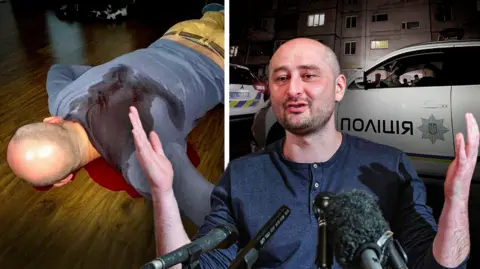 BBC
BBC
"He told me that there was a hit list, and that there were people willing to finance it being carried out."
And what did you say?
"I agreed of course… If you refuse a request like this you probably end up dead."

The broad-smiling, blond-bearded, would-be killer - Oleksiy Tsymbaliuk - is sitting next to me in my car.
Tsymbaliuk, a former Orthodox priest, is the unlikely starting point for the extraordinary tale of how the Ukrainian security service says it faked a murder in order to stop a murder. In doing so, it tried to expose what it says is Russia's involvement in the killing of political opponents.
"I am Arkady Babchenko's assassin," says Tsymbaliuk (pictured below) with a laugh as we shake hands.
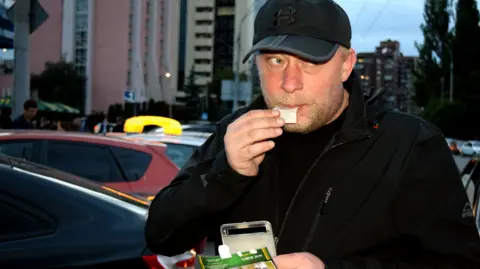

At the end of May 2018, news of the murder of Russian journalist Arkady Babchenko sent a shiver around the world.
Babchenko was an outspoken critic of Russia's President Vladimir Putin, so it was not a huge surprise when his body was found face down in a pool of blood in Ukraine's capital, Kiev.
With the poisoning of Sergei and Yulia Skripal in the UK city of Salisbury fresh in people's minds, the case was quickly seized on as another possible case of Russian aggression.
Within hours it had been raised at the United Nations Security Council.
But all was not as it first seemed.
Twenty hours after he "died", Arkady Babchenko (pictured below) was unveiled at a press conference - tired, apologetic and very much alive.
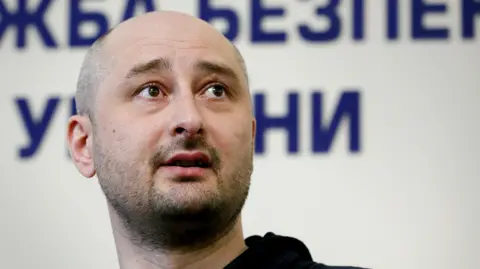 Getty Images
Getty Images
The entire murder had been staged by Ukraine's security service, the SBU, as part of a highly controversial attempt to expose what it says is Russia's role in political assassinations.
Now, for the BBC's Panorama and Our World TV programmes, and Assignment on World Service Radio, I have pieced together the most complete account yet of how and why this incredible hoax was carried out.

The assassin
If it wasn't for Oleksiy Tsymbaliuk, Arkady Babchenko would almost certainly be dead.
A brief flick through the pictures on Tsymbaliuk's Facebook profile provides a crash course in a life already well lived.
There are pictures of him wearing flowing golden robes - when he was an Orthodox priest.
Others show him in military outfits and holding guns - when he was a volunteer for right-wing groups in war-torn eastern Ukraine. For the past four years a mix of volunteers and the regular army have been fighting rebels backed by Russia.
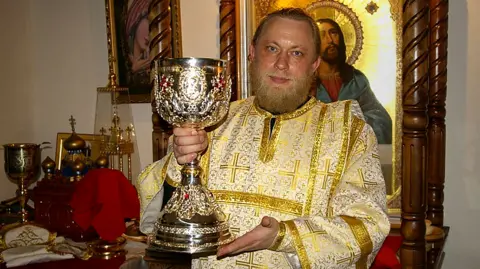

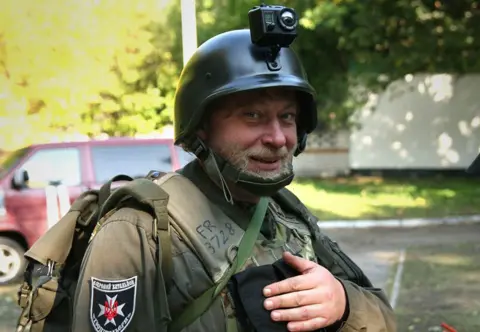

In early April 2018, Tsymbaliuk was approached by an old contact from eastern Ukraine. A weapons manufacturer called Borys Herman (pictured below).
"I was asked by Herman to kill some people, mostly Russians.
"He told me that they're working against Ukraine, they're our enemies, they must be bumped off, and a group of people have allocated a budget to carry this out.
"I agreed, of course," he says with a chuckle.
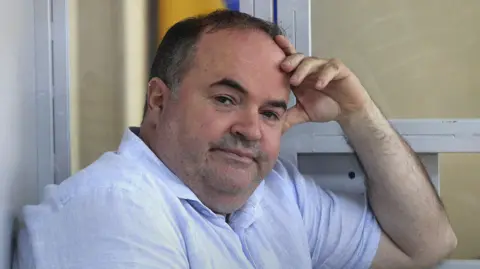

Tsymbaliuk thinks Borys Herman chose him because he thought he could be easily manipulated, and he was soon receiving information about the first target.
In fact, Tsymbaliuk had immediately reached out to Ukraine's security service the SBU.
"We got the information and began to work with Mr Tsymbaliuk," Vasyl Hrytsak the head of the SBU told me.
Hrytsak said the SBU was already aware of Herman's activities and considered him to be a conduit of funds for pro-Russian activity inside Ukraine.
"We told him [Tsymbaliuk] how to behave in such a situation and how to act to gain more information about the crime."


The deposit
From then on, Tsymbaliuk recorded all his interactions with Herman.
"I named the price at $30,000 (£22,600) and Borys Herman said he'd add $10,000 (£7,500) to pay for his beers," Tsymbaliuk says with a smile.
The first tranche of money was delivered in a car outside a shopping centre. Guided by his minders at the SBU, Tsymbaliuk filmed the meeting with a secret camera.
In the footage, which has been released publicly, the two men's voices can be heard discussing how to count the money.
With the first instalment paid, the SBU decided it was time to contact the target, Arkady Babchenko, and start making plans to stage the murder.
"We received information that there were several units in Ukraine. And that this killing [of Babchenko] was just a test run for other assassinations," says SBU chief Hrytsak (pictured below).
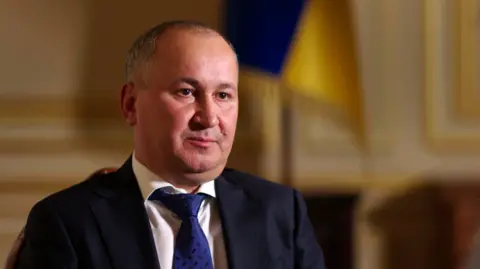

"Only by staging this crime could we get the list of targets which we knew existed.
"We had to know more about who was involved in preparing and commissioning this terrible crime."

The target
A meeting was quickly arranged between Arkady Babchenko and the SBU - where he was given documents and played recordings of Herman and Tsymbaliuk talking.
It's worth briefly dwelling on the Russian journalist's back story and why people might have wanted him dead.
In the 1990s, Babchenko was a conscript in the Russian army. He fought in Chechnya and then became a war correspondent in Georgia and later Ukraine.
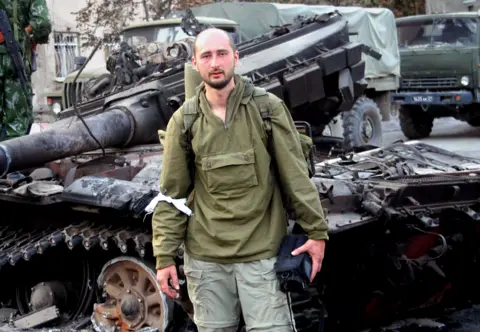 Getty Images
Getty Images
Having seen at first hand Russia's involvement in eastern Ukraine and the illegal annexation of Crimea, his coverage and criticism of President Vladimir Putin - pictured below at his 2018 inauguration ceremony - became evermore acute.
"He's [Putin's] a usurper," Babchenko tells me.
"A little dictator who lives completely in his own world. He wants to be like Napoleon, collecting together all Russian lands."
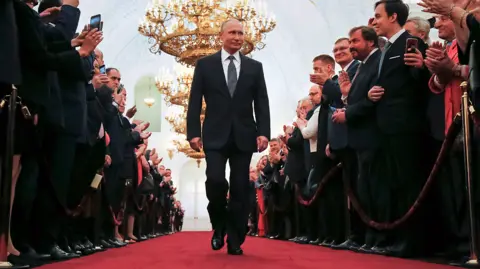 Reuters
Reuters
By early 2017, Babhenko's views and social media posts had made him too many enemies and he was receiving death threats.
Along with his family, he fled Russia. He moved to the Czech Republic, Israel and eventually Ukraine.
There an old friend from Moscow, fellow Russian exile Aider Muzhdabaev (pictured below), offered him a job hosting a show on the Crimean TV channel ATR.
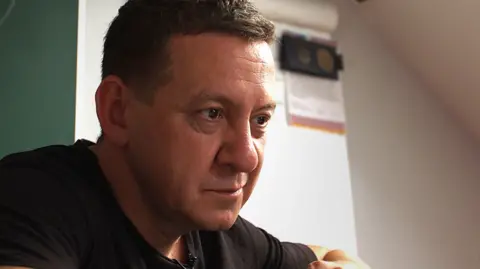

"Babchenko was calling for a boycott of the football World Cup," Muzhdabaev told me in the station's TV studio.
"He wanted more sanctions put on Russia and was writing that it was impossible to negotiate with Putin's terrorist state."

"Catching the reptiles"
Late one evening in early May, after being briefed by SBU agents on the plot, Babchenko returned home to his wife Olga.
He immediately went to the fridge and poured her a stiff drink.
"Before I drank, I turned to him and said, 'What's happened? Tell me.'"
Olga (pictured below) is speaking to me in a safe house that we've rented for the interview.
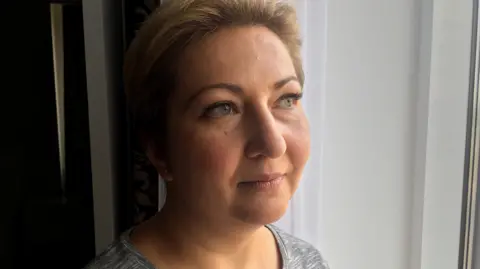

In a soft matter of fact way, she tells me how her husband explained the threat against him and the SBU's plan to fake his death.
"I wanted to escape, to hide, to grab my husband and child and just run far away. I didn't know where to. Maybe a desert island.
"I asked: 'What are we going to do?' Arkady, without hesitation, replied that he had made a decision: 'We will catch these reptiles.'"
For the next few weeks Babchenko was forced to lay low while the fake murder was prepared. At one point, he had to pretend he had hurt his leg to justify staying inside his apartment.
Then, on 29 May, the all clear was given for the special operation to start.

The fake assassination

Oleksiy Tsymbaliuk:
"Everything was simple really, there is nothing special to tell. I finished my soup, called a taxi and went to kill Babchenko."

Arkady Babchenko:
"We had a make-up person who put shadows on my face, as if I'd lost lots of blood. My lips were smeared. Then they poured pigs blood into my mouth.
"Then, when I pretended to be shot, I fell to my knees and coughed a little to make the blood splatter. The make-up person put a blood clot in my nose with the words, Sorry, but we have to do this'.
"I said, 'Carry on - this is your work. This is your job, mine is to lie here.'"

Olga Babchenko:
"My role was to not interfere and concentrate as much as possible on myself and acting the right way.
"I was thinking about how I should behave so it would be as natural as possible."

Oleksiy Tsymbaliuk:
"What did I see when I opened the door? I saw a man in a pool of blood. Everything looked very real. The make-up people did a great job.
"For a moment I thought: 'If this was real it would be awful.' I wished him good health."

Arkady Babchenko:
"I replied, 'Don't make me laugh because I've been killed. It will crack the blood that has dried.'"

Tsymbaliuk left the apartment. Olga called the police and ambulance.
Babchenko's body was taken away, leaving his close friends to grieve.

Olga Babchenko:
"Aider [Muzhdabaev] arrived first. It hurts to remember how he wept like a child whose mother had just been killed in front of them.
"I've never seen a man cry so much before. He just howled.
"I wanted to tell them everything. But I knew I couldn't. This was the hardest part of the whole operation."


Worried about the possibility they were being watched, the paramedics pretended to treat Babchenko.
The ambulance then pulled over, he was pronounced dead and taken to the mortuary.
Details of Babchenko's "death" were soon confirmed by a police spokesman and a photo leaked to social media of him lying face-down in a pool of blood.
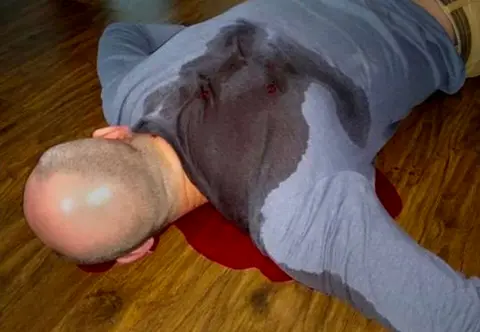 Ukrainian Security Service
Ukrainian Security Service
Aider Muzhdabaev - his friend in exile from Moscow and TV station boss - went outside the Babchenko apartment to brief a growing crowd of journalists.
"It's a huge loss for journalism because he was one of the few individuals who wrote the real truth about Russia and that is why he was killed," he told them.
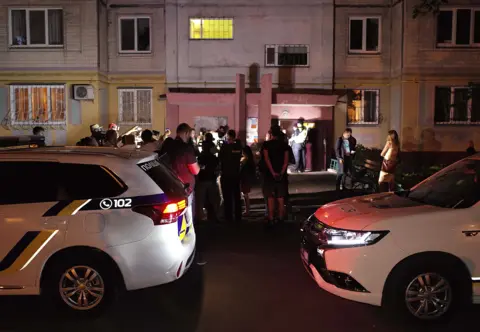 Reuters
Reuters
"It's clear this is a direct, calculated terrorist act made on the orders of the Russian Federation."

The mortuary
Babchenko sat up on the slab and came back to life.

Arkady Babchenko:
"It was the strangest two-to-three hours of my life. I was sitting in the morgue wrapped in a sheet like Gandhi.
"I was smoking and watching TV news about what a wonderful guy I was. Next door, a pathologist was sawing a skull, performing an autopsy."

Olga Babchenko:
"I envied him at this point because he did not have to talk to anyone.
"I thought he was probably in a peaceful place at this point and I was stuck in this agony, because at that moment, everyone was concentrating on me."

News of Babchenko's death travelled fast.
Within hours it was mentioned at the UN Security Council in New York and countries, including the UK, issued statements expressing their concern.
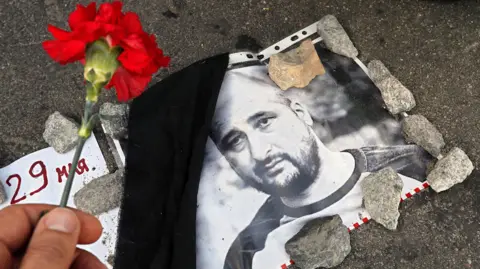 EPA
EPA
Ukraine's Prime Minister, Volodymyr Groysman, went a step further, blaming his neighbour to the east.
"I am confident that the Russian totalitarian machine did not forgive him his honesty and principled stance," he posted on Facebook.

The payoff
Meanwhile, the "hitman" Tsymbaliuk was informing Herman that the job had been completed.
He sent him a text using an agreed nickname for the Russian journalist.
"I wrote to him that: 'The worm has been squashed'. Check the news," he says.
Several hours later, Herman replied saying he'd drunk too much and was hungover. But plans were made to meet up the next day.
Before that could happen the security agencies stepped in.
"We had a plan to wait for longer, to allow things to develop," says Vasyl Hrytsak, the head of the SBU.
"The next day Borys Herman was supposed to pay off Tsymbaliuk for the completed job. But there was lots of noise around the case. All the media was talking about it - so we had to take some steps."
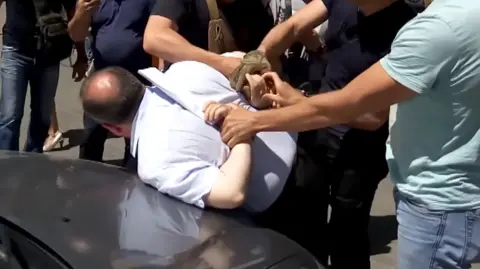 Ukrainian Security Service
Ukrainian Security Service
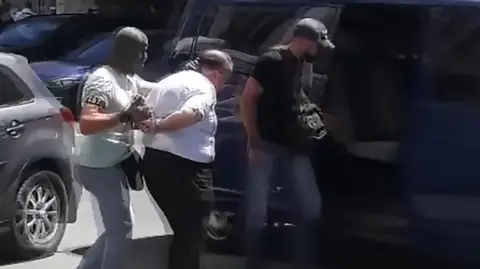 Ukrainian Security Service
Ukrainian Security Service
When information came through that Herman had bought a ticket to fly to Italy, the SBU's agents swooped in and arrested him.
The game was up.

The reveal
At 17:00 on 30 May, a tired looking Babchenko was revealed to a packed press conference at SBU headquarters.
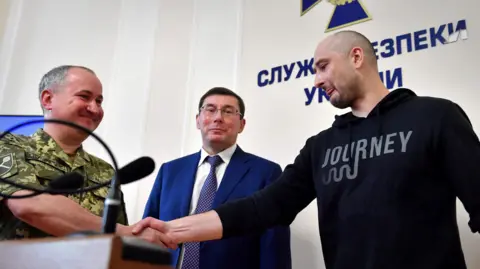 Getty Images
Getty Images
To gasps of astonishment, Vasyl Hrytsak explained to journalists it had all been staged.
An emotional Babchenko took the microphone to say sorry for misleading people.
"I've had to bury colleagues. I've had to bury friends. I know the sickening feeling when you bury your own," he said.
"But there was no other way."
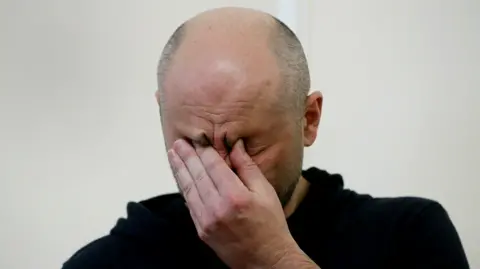 Reuters
Reuters
Mobile phone footage from Babchenko's TV channel shows his colleagues cheering and staring open-mouthed at their own coverage of the press conference.
"I just ran outside and lay on the grass," his boss Aider Muzdabhaev told me.
"I lay there for about one-and-a-half hours looking at the sky. I felt very good."
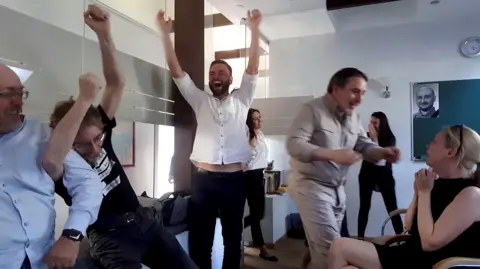 Reuters
Reuters
Plenty of Ukrainians saw this as a simple "win".
Babchenko's life had been saved.
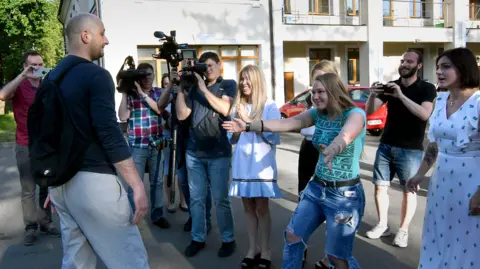 Getty Images
Getty Images
But not everyone was quite so delighted.
For some, particularly those observing from abroad, this wasn't a good news story.
"I think it was infantile. I think it was a disaster for Ukraine," said Michael Bociurkiw (pictured below), a global affairs analyst with particular focus on Ukraine.
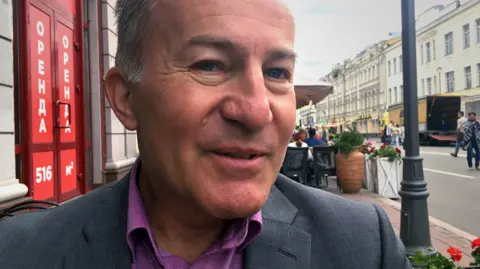

"To many people, I think it sounded like Ukraine was taking a page out of the Russian playbook of using fake news to convince people of something."

The hit list
So what then did Ukraine get out of it? And why was it necessary for it to be taken so far?
"Even if we just saved the life of Arkady Babchenko it's a success," Vasyl Hrytsak says defensively.
"But thanks to this operation we've also got a list of 47 targets - journalists, activists past and present, citizens of the Russian Federation.
"We got information about the activities of the Russian special services on our territory."
That list - according to the SBU - was obtained from the phone of Borys Herman when they arrested him the day after the fake assassination.
The SBU says it was only sent to him from his contact in Russia once the Babchenko death was confirmed, hence justifying the fakery.
The first man on the list is Babchenko's boss Aider Muzhdabaev. He immediately accepted the offer of round-the-clock state protection.
Others are much more cynical. They point to the fact that a significant number of those on the hit list are Ukrainian journalists with relatively little to do with Russia.
Sonia Koshkin (pictured below) is one of those who has refused protection.
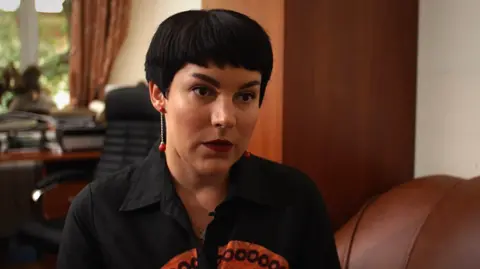

She believes that the hit-list of 47 is - like the murder - fake, and that 17 names including hers were added to the 30 Russian-linked ones by the Ukrainian security service.
"Primarily the aim was to scare. Because when a person is scared they change their behaviour," says Koshkin.
"They're nervous. They don't think about what interview to do or what post on FB to leave - they are just thinking about how to stay alive and their security."
So what, I ask her, is going on?
"I think this story will come to nothing. It's just a big bang to frighten people."
The SBU insists the list it released is the original one.

The Russian connection
Ukraine says links to Russia's security services have been exposed through a man called Vyacheslav Pivovarnik (pictured below).
A Ukrainian, who according to the SBU now lives in Russia, it's claimed that Pivovarnik was a key player. Providing the orders, hit list and money to Borys Herman.
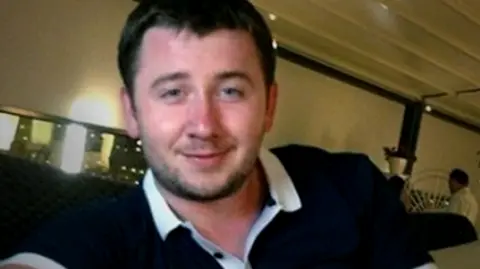 Vyacheslav Pivovarnik's social media
Vyacheslav Pivovarnik's social media
On the 15 June it was announced that Pivovarnik had been charged in absentia by Ukraine. The BBC has sought to get his response to the charges, but has not been able to contact him.
The SBU told me that the morning after Babchenko's fake murder, the following messages talking about making a final payment to the "assassin" Tsymbaliuk were exchanged over the messaging platform Signal.

Vyacheslav Pivovarnik:
"Hello to the alcoholic [a reference to Herman's drinking]."

Borys Herman:
"Hi, the Church [a reference to Tsymbaliuk the monk/priest] is asking for a second payment, but I am empty."

Vyacheslav Pivovarnik:
"How much money?"

Borys Herman:
"15 [reference to the outstanding balance of $15,000]"

So far, no journalist has managed to track down Pivovarnik, so attention has focused on Borys Herman, the alleged middle-man.
Given the recordings and messages that exist Herman hasn't denied plotting either with Tsymbaliuk or with Pivovarnik.
His defence is that it was all an act - and that he was also working for Ukraine's security service. He says he specifically chose Tsymbaliuk as the assassin because he was a priest - hence unable to kill.
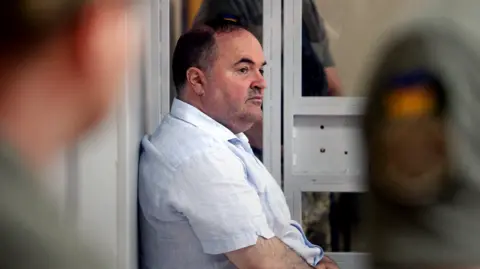 EPA
EPA
When Herman appeared in court in Kiev, I asked him why we should believe that he didn't want to kill Arkady Babchenko.
"Because I am not an idiot. Why do I need it? Why do I need it in my situation… to do something so foolish?
"My job was to get the hit list - and in order to get that I had to make it look like it is happening."
So far, despite my repeated requests both to him and his lawyer, Herman has not been able to provide any firm evidence to prove he was working for Ukraine's security service.
With Pivovarnik almost certainly remaining in Russia, it appears unlikely that the Russian link to the investigation will ever be fully revealed.

Russian reaction
The BBC approached the Russian government for its response to the Babchenko case and the way Ukraine had handled it.
"My first feeling was that it's magic, it's great, he's alive," Maria Zakharova (pictured below), the foreign ministry spokesperson says, before twisting the knife.
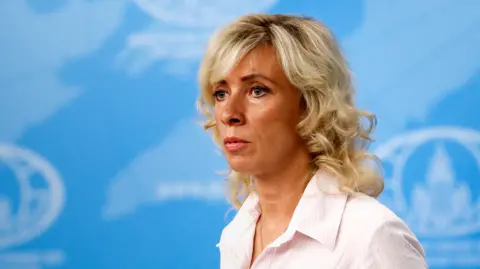 Getty Images
Getty Images
"But immediately I got another feeling… I mean the Ukrainian officials who were involved in this thing… did they realise what they did?
"Because now nobody will trust Ukrainians and the Ukrainian government any more in any sort of future cases."
And what of the fears that Babchenko and other Russian dissidents have - that they are targets in Kiev?
"This is ridiculous, this is absolutely absurd," says Zakharova.
"Russia as a state has nothing to do with Arkady Babchenko. He's a free man in a free world. He can do whatever he wants."

The aftermath
For those directly involved in the fake murder, life will never be the same again.
Tsymbaliuk, the hit-man, seems the least fazed by the experience.
As we drove around Kiev together he told me he was planning to write a book about his experience.
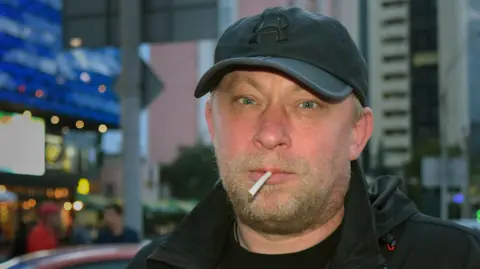

"The war in our country is not over," he says. "I'm not going to change anything in my life. I will return to war. To live. To work. To fight."
Arkady and Olga Babchenko may never feel secure in Ukraine again.
"I'm worried," Olga says. "I do not feel safe. At the moment, yes, we are in a safe place - but I do not feel safe. One day it will be necessary to venture outside our protected territory. What will happen in the future - we just don't know."
Arkady Babchenko, himself, still burns with indignation when pushed on the ethics of what he did.
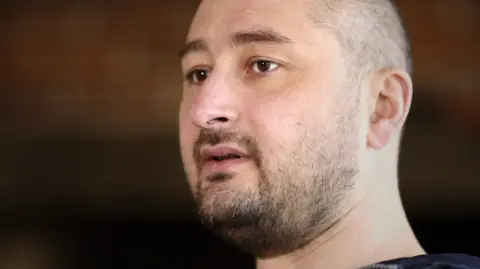 Reuters
Reuters
"I understand where all this criticism comes from. It comes from people who talk hypothetically about morality and ethics and about good and evil.
"Well guys, I wish you were in my situation. When they come to you and say, 'Someone has paid money to have you killed.' Will you say, 'No, I refuse because my readers will not understand. It will violate the ethical standards of journalism.'"
"By doing so people will die - because this network would not have been exposed."

Watch The Faked Murder that Fooled the World from Panorama on BBC One at 20:30 on Monday 23 July - or on the BBC iPlayer.
Also showing on Our World on the BBC News Channel at 04:30 and 21:30 on Saturday 28 July - and 03:30 and 21:30 on Sunday 29 July - or available via the Our World website.

Top image copyright: Ukrainian Security Services, Getty Images and Reuters
